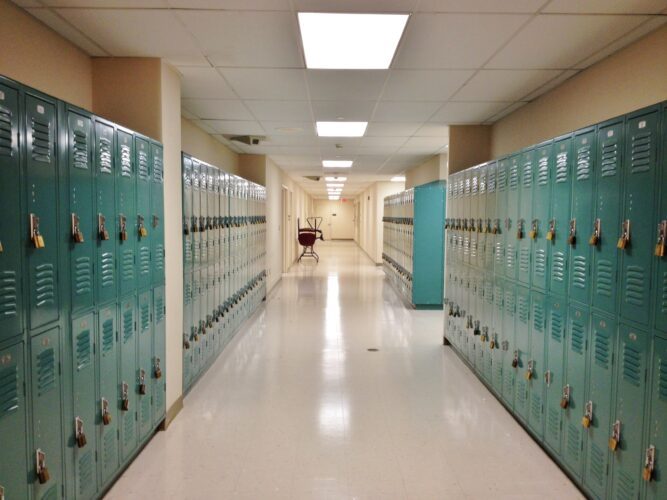Guest opinion: Dear parents: Here’s what your high school student secretly wants you to know

Stock photo
It started as a regular Socratic Seminar: I posed an overarching question, and the students did the rest of the talking (aside from the occasional follow-up question I included when the discussion slowed). We were discussing how strict electronic restrictions for minors should be and, as usual, the researched points and personal opinions flowed freely.
But then, the conversation shifted.
The turning point was a student saying parents should take children’s phones before bedtime. This led to a discourse on how few boundaries students felt their parents provided and how they should have had more instruction. They concluded that when they became parents, they’d take a more active role to better prepare their own kids for adulthood.
In education circles, we talk about “gradual release of responsibility”: The older or more knowledgeable a student gets, the less scaffolding educators should provide, allowing students to practice skills on their own — with support available as needed. In theory, by the time students graduate high school, they should be independent enough to lead a successful adult life.
It’s tempting for you, the very exhausted parents of teenagers, to think that they don’t need you anymore, can take care of themselves or won’t listen when you try to help. Teens often believe those things, too, no matter their relationship with their parents. Many of us remember the scene from “The Little Mermaid” where Ariel shouted at her father, “I’m 16! I’m not a child anymore!”
As teenagers, we agreed with Ariel. As adults, we realize she still had some growing up to do.
Think of most adolescents like cats. They appear standoffish, and they’re quick to hiss and swipe if they don’t like what you’re doing. Like many teenagers, cats do love their owners, but in a more subtle way. Many cat owners will tell you that the trick to keeping your feline friend from bolting at the slightest twitch is to be patient and become a safe and consistent presence. As a high school teacher of 14-plus years, those kitty skills have translated very well to my classroom.
My students’ discussion, in a rare moment of honesty, revealed that these rebellious youths who hiss and swipe at adult intervention quietly recognize they still need it — and even want it. They like knowing their parents care enough to hold the line and stand firm against their angst. They like the idea of already knowing everything, but they learn (as we all do) that there’s still much to learn, and they would love it if someone showed them the ropes without making them feel bad for needing help.
Even when it’s not obvious, your youngsters internalize more of your beliefs than you think. They might rebel against those principles right now, but many grow into familiar echoes of their parents because, deep down, they believe your worldview comes from experience. When peer pressure is at its pinnacle, they’re desperately looking for a group they fit in with who also cares about them. You can be that person who cares about them and reminds them that they fit in with a group: your family. They may “hate” your curfews and guardrails, but we teachers see the benefit of your care every day (and your kids eventually see it, too).
So what does this mean for parents — especially the ones who feel shut out?
It means showing up anyway. Asking questions about their interests. Inviting them to join you in a “boring” activity like a walk or errand. Watching a movie together and talking about your reactions. Sitting beside them while they do homework or practice.
Small efforts matter more than perfect timing.
Are you worried that it’s too late to guide your teenager? It’s not. They might be outwardly annoyed, but inwardly, they want to know you’ll show up, hold the line and lead them forward. Even if it means having an honest but awkward conversation about your hopes and fears for a better relationship, they’ll appreciate your effort more than they’ll admit. It might even coax them into sharing their own hopes and fears with you.
Your cat-like teenager needs you. They want to be near you, even if they flick their metaphorical tails in agitation and sit in the farthest corner of the room from you. So keep texting them, even when they leave you on “read.” Keep inviting them to places, even when they turn you down. Keep showing up. It mattered to the students in my Socratic Seminar, and it matters to your kids.
Eventually, that feline-ish offspring will choose to curl up next to you and show you some affection. Just … remember they’re still a little skittish.
Amy Nolan teaches English language arts, multilingual literacy, journalism and theater at George Washington High School in Ogden School District, where she is also the Alternative Language Services coordinator. She joined the district in 2021 after a decade teaching high school English in Arizona, Texas and Missouri. Amy was named George Washington’s Telitha Lindquist Greiner Excellence in Teaching Award winner in 2023, as well as the secondary teacher of the year for Commerce ISD (Texas) in 2019. She holds two Bachelor of Science degrees in secondary English education and theater from Hannibal-LaGrange University and a Master of Education degree in teaching and learning from Clemson University. She believes every student, no matter their background, deserves the support they need to build a successful and fulfilling adulthood.



